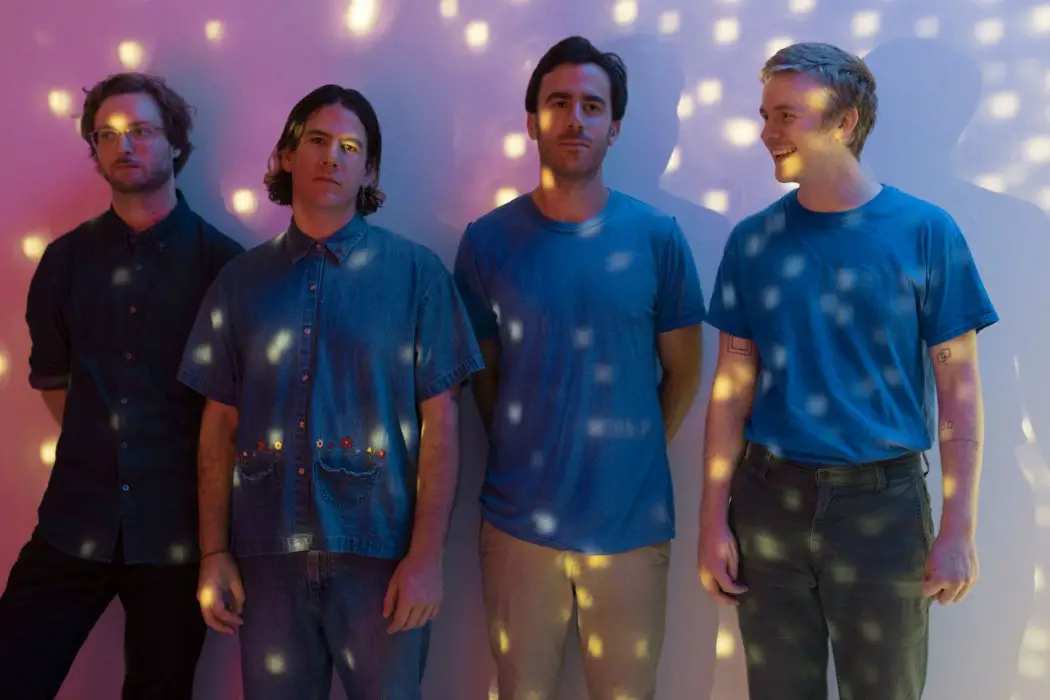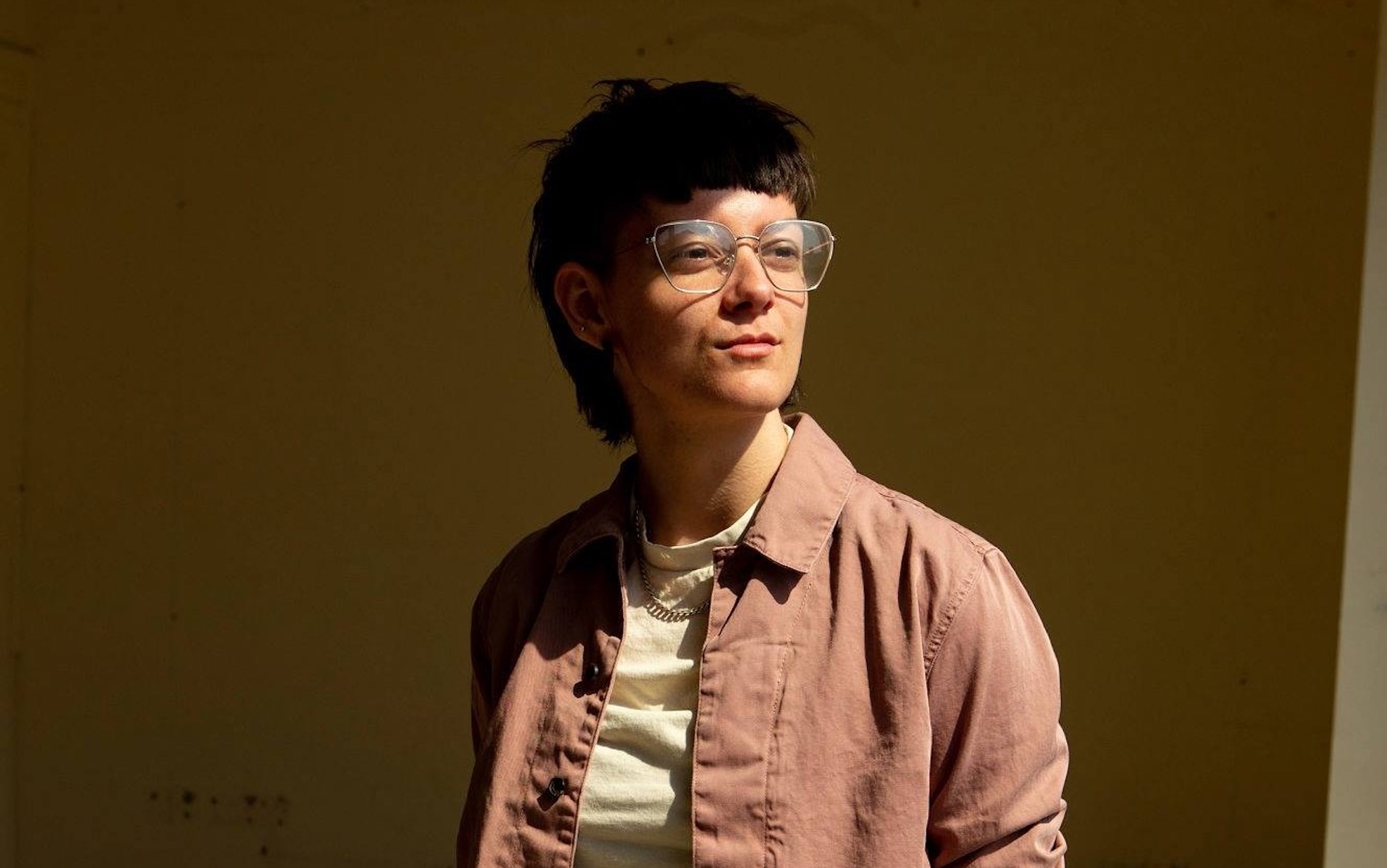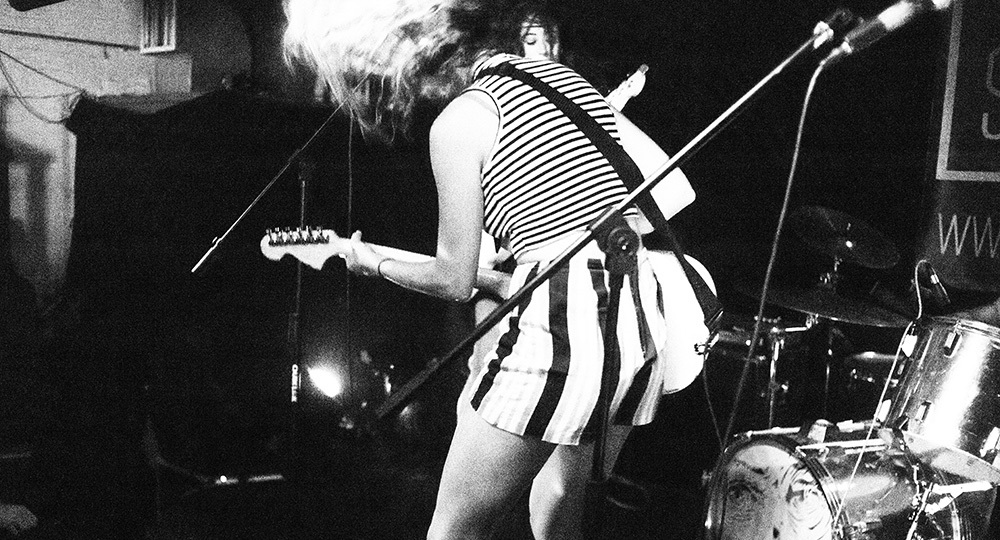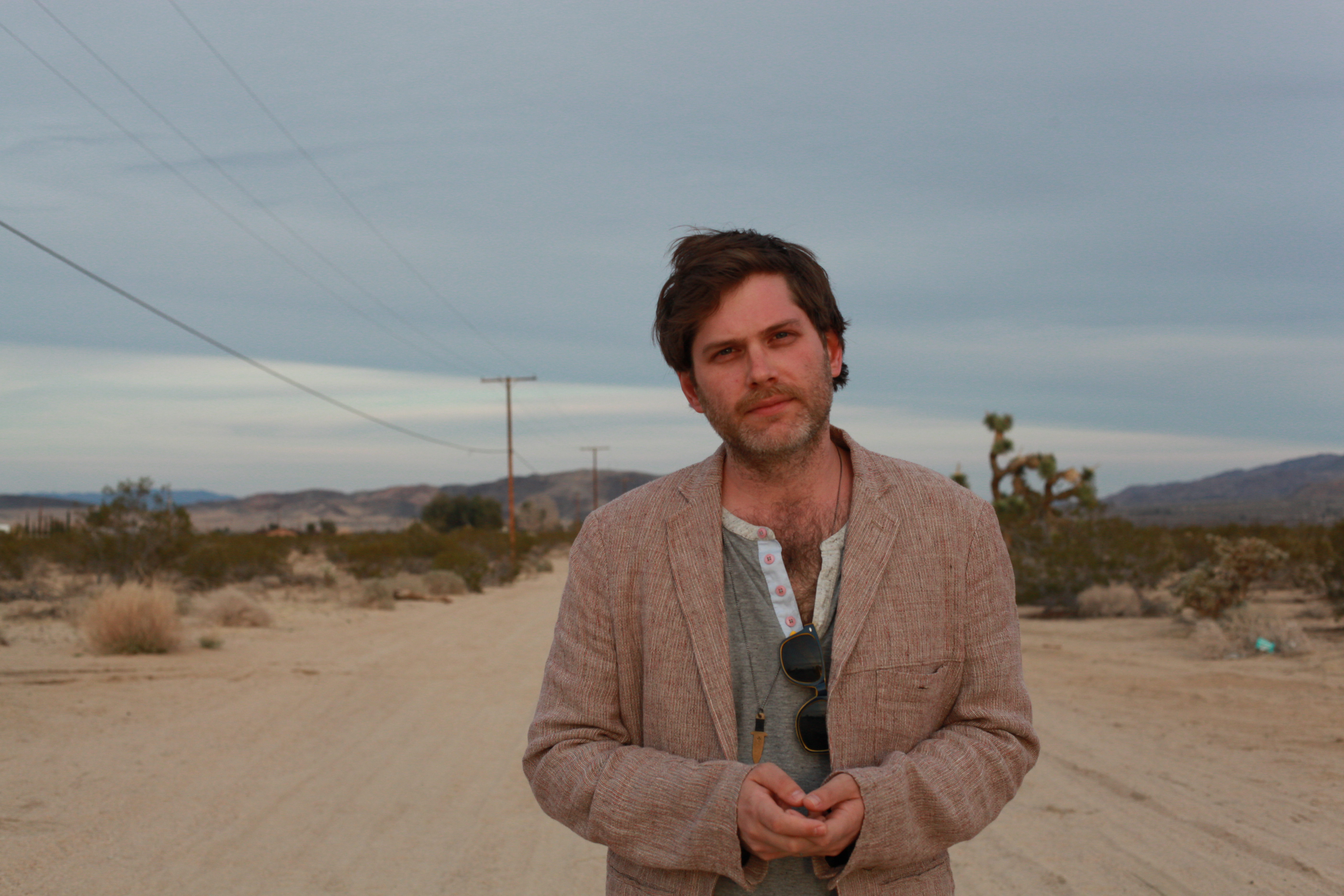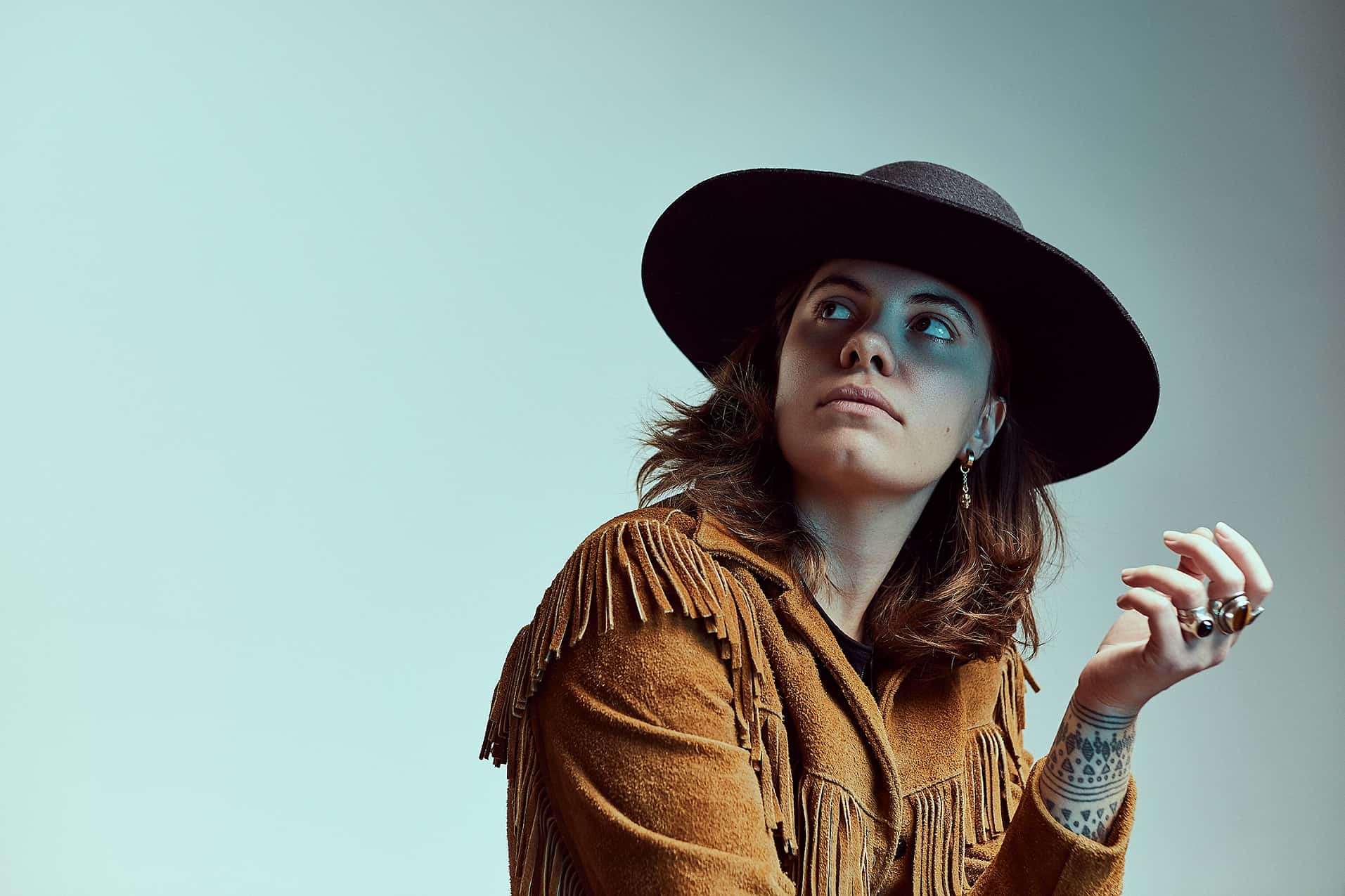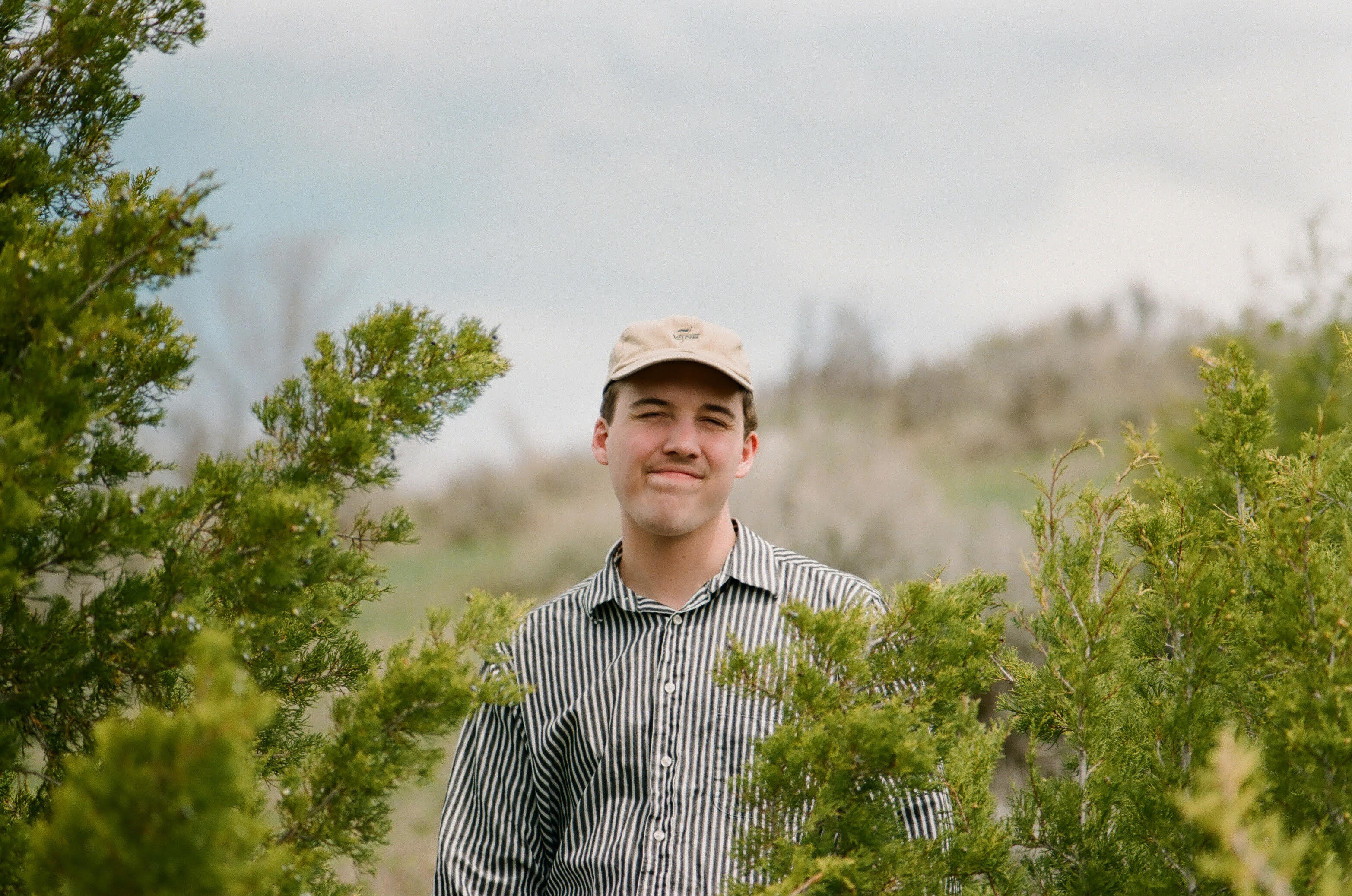In this lengthy discussion, Atwood Magazine speaks to Pinegrove’s Evan Stephens Hall about the band’s ambitious Pinetabs project, changing songs on tour, and their excellent fourth album, ‘Marigold’.
 follow our Today’s Song(s) playlist
follow our Today’s Song(s) playlist 
Stream: ‘Marigold’ – Pinegrove
From heartfelt outpourings to the subtlest shades of intentionality and everything in between, New Jersey’s Pinegrove have always had a way of keeping their fans on the edge of their seats. Throughout their fourth full-length album, the band branch off with their most diverse and thoughtful music yet.

Released January 17 via Rough Trade Records, Marigold sees the New Jersey band exploring the punk and alt-country elements that defined their breakthrough success Cardinal in full force, while also veering more into indie rock territory.
“Trying to squeeze this collection of tracks into any specific genre box is, for all intents and purposes, pointless,” wrote Atwood Magazine‘s Bethan Harper last month. “The album takes inspiration from ’90s alt-rock, folk, country and pop to create music that is wistful, vibrant, nostalgic and forward-looking all at once. It may be difficult to pigeonhole Marigold, but one thing is for sure: Pinegrove have created a thought-provoking reconciliation album that has set them up to continue as the incredibly talented touring band that they have always been.”
Singer-guitarist Evan Stephens Hall wants to bring a sense of unity through his music, and through live shows and projects like Pinetabs, Pinegrove certainly succeed. Marigold is an extension of that feeling.
Pinetabs is an ongoing effort to make every Pinegrove song available for any person who may want to play them. While the project is a sense of Hall saying, “These songs belong to anyone,” it was also an interesting experiment, where every track was released from Marigold in tablature form prior to the album’s release. “For anybody that took a crack at those songs, they had to be making decisions that a songwriter makes,” Hall told Atwood Magazine.
It’s impossible to write about Pinegrove without discussing the context surrounding their last album, Skylight. In November 2017, Hall wrote a lengthy but vague Facebook post where he ousted himself for sexual coercion. Both Pitchfork and The New Yorker published in-depth pieces that handle the issue well and sensitively. These articles detail the experiences and Hall’s anonymous accuser requesting that the band delay the release of Skylight and take a year off touring, and for Hall to enter therapy. “He really had no control over me,” his accuser told The New Yorker. “But, in the bubble of tour, I really felt like he did.” Hall has since spoken about acknowledging his position of privilege and power.
“I perhaps naïvely thought there was no power structure there,” he told The New Yorker.
Over the course of our interview, the accusations brought against Hall did not come up; with Pitchfork and The New Yorker‘s in-depth reporting, our editorial staff did not feel like we could add enough to that conversation to do it justice, especially without the resources to contact Hall’s accuser.
Atwood Magazine spoke to Pinegrove’s Evan Stephens Hall about Marigold, changing songs live, and geometry.
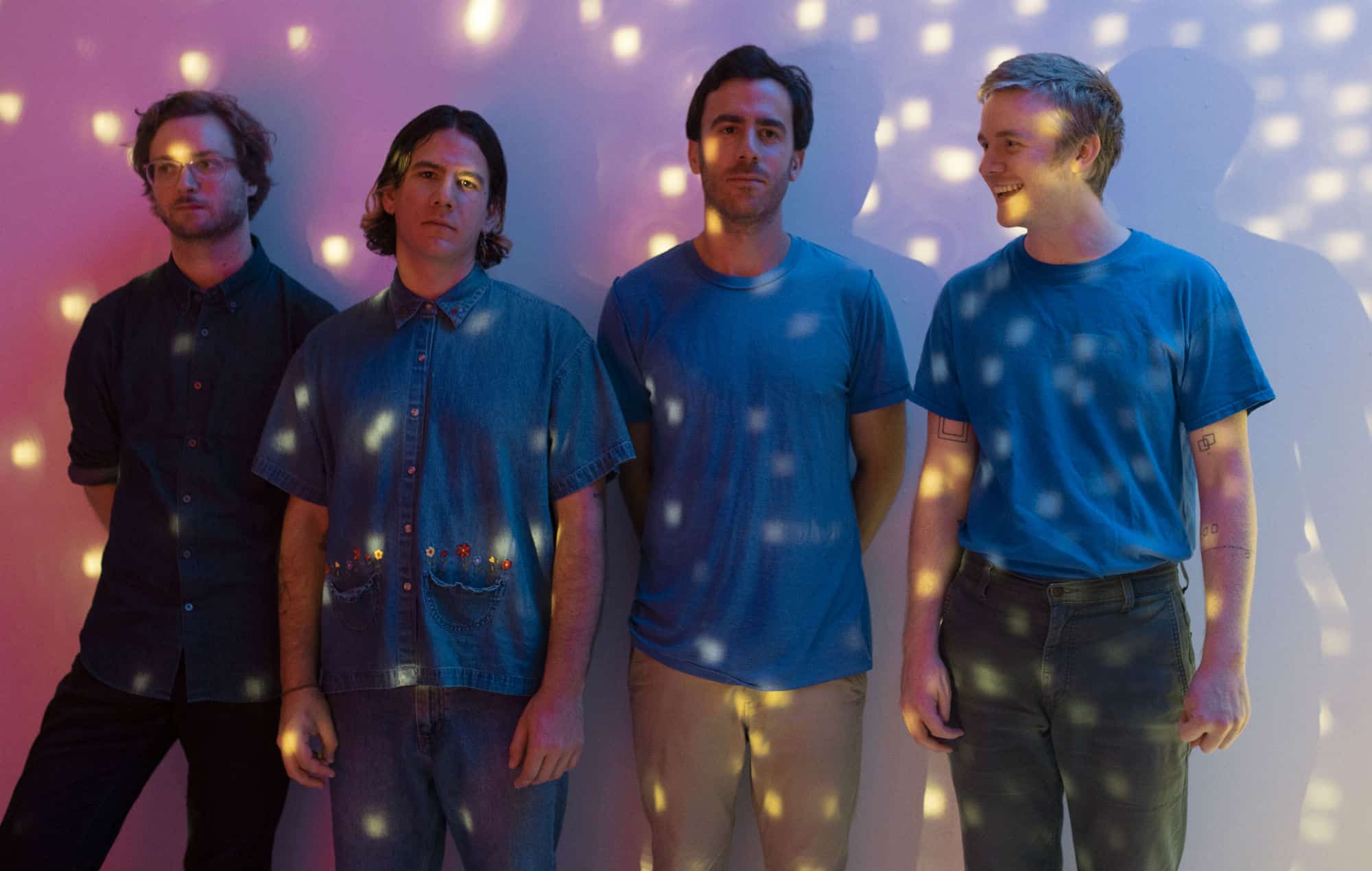
A CONVERSATION WITH PINEGROVE
Atwood Magazine: Something that I’ve found consistent with Pinegrove albums is that genre is fluid. Going from DIY/punk/emo to a more straightforward indie rock band on Cardinal and Skylight, but Marigold has more elements of punk, jam bands, and country incorporated. Can you talk a little bit about how genre plays into Pinegrove?
Pinegrove: We’re just coming from a place of making music that we want to hear, and we like all those genres that you mentioned. To create the music that’s very particular to our ears involves taking what we like from a lot of different styles. From a composition perspective, we’re not ever writing to a genre.
As I’m saying that, I’m realizing, well okay, sometimes if we’re trying to communicate a sound or an idea or something, we might refer to a genre or to something within a genre to make our point, in the rehearsal or arrangement space. Respectfully, I think that’s more of a question for music journalists. I like reading about music a lot, and I think the question of genre is a really interesting one. It involves the type of essentialization that is not really part of the composition process.
It’s not necessarily sitting down thinking, “We want to write a song that sounds like a punk song or a country song.”
Pinegrove: Totally, but we will say, “We want to get heavy in this section. We want to obliterate. We want to go as dark as possible, or we want to be really nimble here.” We might say “twangy,” but that’s a little cart before the horse. Genre and conversations about genre tend to be for describing music that already exists, but it doesn’t feel all that relevant to me in the process of composing or arranging.
Can you tell me more about the writing process for Marigold in particular?
Pinegrove: I don’t think I was doing anything all that different, as far as what my routine was. This one happened more quickly than others did. When I’m writing, I’m trying to open up a space for myself that feels comfortable whatever’s ping-ponging around in my brain. That space is centered in empathy and compassion and introspection, just trying my best to spelunk in my brain and find whatever it is I’m thinking about or feeling. That’s usually a place to start, but I do my best to stay out of my own way as much as possible and try to listen to what the song wants to do, and take cues from that. So, I can reinforce the song’s message.
Maybe a better way to say that, that’s slightly less esoteric, slightly more true to what my actual procedure is. I’m just looking for opportunities to make connections for different parts of the song to speak to each other. For different songs on the album to speak to one another. Try to create a unified message, one where the brushstrokes are pointing toward something bigger.
In the time that Skylight was delayed, were you working on this album?
Pinegrove: Yeah, absolutely.
When Skylight came out were you itching to play these?
Pinegrove: Yeah, and we did do a few [laughs]. If you’ve seen Pinegrove live before Skylight came out, you would’ve seen us play a bunch of the songs from Skylight too. A lot of bands do like to test out material on the road. Radiohead is a perfect example. They would just go on tour with a new batch of songs before they even recorded the album. I think that’s a smart way to do it. Animal Collective too would frequently just play all new material.
It’s interesting. There’s something a little antagonistic, at least to our expectations of what a concert should be. I’m thinking back to when my dad saw Bob Dylan play in Montclair, [New Jersey] at a minor league baseball stadium. The massive takeaway from that was “Wow, he played a lot of songs I wanted to hear, but he completely altered the melodies. It was like new songs.” For some people, that was disappointing. I think it’s artistically interesting to play with expectations like that. On one hand, to fulfill expectations and on the other, to subvert them, and playing with that line. I know I’m kind of going on a tangent here.
I feel like as a fan, when I go to see an artist, I want it to sound like the record, but I also want it to be slightly different and better than the record, but I also have friends that are into jam bands that want the shows to be different every single time.
Pinegrove: I think that our method nods to both of those camps. You will see the main melody, the primary melody, the one that people are expecting, the one that’s on the record will be in the forefront, but I also like to improvise on that. There’s an interesting problem that I’ve come up against, which is that: if people are singing along, there’s something that feels slightly rude about changing the melody on people who are singing. I feel conflicted about my impulse to improvise and wanting to inspire community, and it’s sort of funny that those two things are at odds, because they really have nothing to do with each other.
I feel like acknowledging it creates a different sense of community. Once I was at a show in the front row and the lead singer changed a line, as I was singing along, but we made eye contact as I was singing along, and he giggled, and that’s a cool little moment, even though I wasn’t singing the right words.
Pinegrove: What would you think if that singer had said something to the effect of, “I love it when you sing along. I’m gonna change this one up a little bit.” Do you think that would prevent people from singing or what would happen if he gave you the cue that something was going to change?
That’s interesting.
Pinegrove: Giving away the punchline?
If I just heard, “We’re gonna change this up a little bit,” I would think, “what exactly is going to change?” which doesn’t necessarily mean the melody. Interestingly, the two times I’ve seen Pinegrove, once was an acoustic set at my college, and the other was full band right after Cardinal had come out, so you had the full band, but it was night and day experiences.
Pinegrove: We do try to make an experience for anybody who’s coming to see us. I think the re-arrangements that we tend to be more of a change in feel or tempo or dynamics, more than something that we might consider the signature of the song itself, which dovetails nicely with what we were trying to do with the Pinetabs project.
That was actually going to be my next question. For readers who may not know, can you explain Pinetabs?
Pinegrove: That’s coming from a place of wanting our songs to be available to anybody who wants to play them. I consider them folk songs or pop songs for the people. We’ve been embarking on a project that was going to make available all of the chord charts and tabs for all of our songs. We’re about halfway through at this point.
We were working on Marigold to have them ready to come out along with the release. We were thinking, “Wouldn’t it be strange if we did it before it was released?” Some context there: Tablature is a notational system that relies partly on having heard the songs, because there’s no rhythmic notation. It’s just chords and lyrics and the relationships between the chords and the lyrics.
To give people just the chords and the lyrics without any other notation-melody, for instance, was completely absent. That turns out to be delightfully abstract. For anybody that took a crack at those songs, they had to be making decisions that a songwriter makes, when they’re writing a song: phrasing, when to change the chord, what type of mood they’re after, and most importantly, the melody.
We had a really diverse range of submissions that taught me more what the spirit of the project was. When we were just imagining it, it was tough to know how people would react. We were really psyched on how many people had submissions. It was really great.
Did any of the submissions influence the way that you’ve thought about playing them live?
Pinegrove: That’s a good question. Not specifically, but it has got me thinking-so I’m writing a new batch of songs now. It’s given me a little bit more freedom. If there’s a certain section that’s not quite working, but I’m very attached to how that goes.
As a writer, you probably will sometimes be working with a paragraph, and it’s like “I know this isn’t quite right,” but it’s so hard to imagine it any other way. Without completely re-tooling the paragraph before and the paragraph after, and then ultimately, the entire piece. It can be the same with songs.
I’m reminded that actually there is no limit to the amount of ways this could go. There’s no better lesson for a songwriter to learn that you can really keep going until you’re just totally happy with it. There’s no reason to settle for anything that doesn’t completely let your mind up.
Were there any that you were especially impressed with?
Pinegrove: I think my favorite one was by francisofdelirium. She did a faster, more angular version of “Alcove,” and I sometimes get that melody stuck in my head. I might want to do a cover of that.
A cover of a cover! Two of my favorite songs on the record were “Phase” and “No Drugs.” Would you mind talking about the writing and recording process of those?
Pinegrove: Maybe I’ll start with “No Drugs.” We tried that one for Skylight, but it didn’t quite work out. I think that more than anything, it just didn’t work with the batch of songs. When we were trying to find a good place for it in the sequence, we just couldn’t!
For me, and for a lot of the band, we work based on how the song makes us feel, like how enthusiastic we are to work on it. We don’t try to treat the songs diplomatically or evenly. We work on whatever we want to work on, and whatever we don’t want to work on, we take that as a signal that maybe there’s something wrong with it. Maybe it needs more work, ironically.
The process is similar for developing a sequence. Every song should be vying for first place in a way. We want them all to be equally good, even though they’re all playing different roles. We discovered that “No Drugs” wasn’t going to be part of [Skylight], and it moved straight into this other batch, quite seamlessly. It found a better home there. We were able to do a more lively arrangement this time around. Sometimes, it just takes a year or two to have more perspective on a song. I was really happy to have learned the lesson of patience with that one.
It’s one that I learn again and again. Like “New Friends” took so long to write.
That was included on Everything So Far before it was on Cardinal correct?
Pinegrove: Yes, but it’s the same recording actually. The conversation there was basically, if we just put that out as a single, then we can introduce listeners to-I don’t know [laughs]. The case was made, and I agreed.
Everything So Far was put together after Cardinal was finished, and I was already starting to write Skylight, weirdly enough. So, “Angelina, which was intended for Skylight, we decided to put the demo of that on Everything So Far. So, that was the first song that I wrote after Cardinal, but Everything So Far came out before Cardinal came out, because it was just a cassette release initially and vinyl takes forever to produce.
Back to “No Drugs:” I wrote that song from the perspective of trying to challenge myself to lead a more intentional life. I have struggled with my relationship to drugs and alcohol, really trying to figure out if there’s any way that benefits me or not. Right now, I’m in the not camp. I’m not using any of that stuff, and it’s actually going very well.
It’s good creatively too. I didn’t really expect that. I think that I’d been using especially weed and alcohol as a creative crutch. They were part of the process. They were baked in, so to speak, and that wasn’t serving me anymore. I had to acknowledge that, and that’s been tough. It took me a long time. I’m still early on in the process.
I think another reason that “No Drugs” didn’t make it was that I wasn’t there yet. It was a song written from the perspective of the future sort of, and I hadn’t caught up yet.
That’s an important one to me. I hope that anybody who’s struggling with something similar might find something helpful in it.
Well, I think that’s why it spoke to me. (laughs)
Pinegrove: I’m happy that you found something in it. That’s a song about patience. Patience is a theme on the album. It’s a song about patience and memory, the experience of time, humility to understand that we don’t really have that much control over exterior circumstances. Those are all related and considered on this album. Those are the questions I’m trying to ask. “No Drugs” really does typify a lot of those inquiries.
For “Phase:” Marigold is a “concept album.” They all are. I think it’s impossible to avoid writing a concept album, because an album, by definition, is just songs that are collected together. That involves some decision, and what songs have you decided to add? What are you leaving off? We’re culling from infinity. You can make any song you want. You can make any album you want. So, why has this or that songwriter chosen to put all these songs together? There’s gotta be some conceptual linking. Some albums are like short story collections. Some are like novels. Some are somewhere in between. I’d argue that my albums are somewhere in between.
One seam throughout the album is that the first-person character, which is some sort of exaggerated or essentialized version of myself, but is not myself exactly, because I am not a song. I’m a person with skin and bones and blood and organs and oxygen coming in and carbon dioxide coming out.
Within the album, there’s this one endless night that’s referred to over the course of a few different songs. Some retrospectively and some in the moment, and “Phase” is the song that is supposed to be what that night is like, and “Endless” is referring to the endless night. The first line of “Phase:” That night when I lifted my head up. That’s what I’m referring to. So, I’m trying to connect the dotted line on “Endless” here. They should be in conversation. With “Phase,” I’ve zeroed in on this night and want to talk for the length of the song what that night was like.
It’s a song about night time anxiety, about little anxious versions of yourself marching around on your pillow, looking around your room, seeing stacks of books you should’ve read by now, seeing a pile of clean but unfolded laundry. Making a list of things you should be doing besides sleeping or stuff that you’re anxious about, accumulating in list form. There’s some half-dream, hallucinatory second verse: The bramble scratching at the window/The silver shining on the thorns. Everything is a little extreme there, kind of how the moon can haunt your consciousness.
More than anything, I’m excited to point out its relationship to “Endless” and to “Dotted Line.” I kind of see it as the centerpiece from a narrative perspective of the album.
Do you feel like often you write songs to connect together in that way?
Pinegrove: Yes, but the honest answer involves that I’m just looking for opportunities wherever I can find them. It’s not that I started out thinking that I wanted them to connect in that particular way and was seeking a way to do it. It was more that at a certain point, I saw that these themes were re-emerging in the work, and at that point, you have two choices: you could say, “Well no, that’s redundant and I don’t want repeated images” or you could link it in a more intentional or deliberate-feeling way.
It’s all an illusion right? There are things going on that are intentional. There are things going on that I haven’t noticed yet, but some part of my brain did, and there’s other things that are just accidental. I think as the listener, you have to assume that it’s all intentional, and I want to give the impression that it’s connected thematically on purpose. I think that engenders trust in the listener that they say, “Okay, this songwriter knows what they’re doing, and they’re a trustworthy guide to take me through whatever they want to take me through as a listener.”
When Skylight was released you didn’t tour in a traditional sense, right? It was more just a handful of shows?
Pinegrove: Yeah, we did like five shows on the east coast to see how it would feel.
But there is a big tour for Marigold. Are you excited to tour in a more traditional sense this time and what is it like doing small batches of shows rather than a big traditional tour?
Pinegrove: That’s a good question. I think when you’re on a tour, you are able to build up a little bit more momentum. We’re trying every single time to make the show unique. So, the goal is the same, but I think when we’re on longer tours, we’re able to get the momentum-I’m trying to avoid the phrase “Get in the groove.” I don’t really like that, but y’know toboggan productively towards good performance. [laughs]
Right - get in the groove, so to speak.
Pinegrove: Yeah, so to speak! Sit in the pocket. I’m excited, and I love the west coast so much, and what better time to visit than February? We live in upstate New York, so we’re eager to get out.
The last question I wanted to ask is: What’s up with you guys and rectangles?
Pinegrove: I see rectangles as picture frames, and one question an artist is asking is: What’s included and what’s excluded? The picture frame is a really good shorthand for that question. When I’m talking about art, which I am a lot in my songs, the album Skylight is basically an ode to what art can do, how it can connect us, how it can let us escape for a little bit, how it can help us dig deeper into ourselves. All of these questions orbit around this one shape for me. It’s a way to ask these questions quickly, without having to go into it each time.
Whenever you see a square or rectangle in our body of work, that tends to be a reference to the power of art. As such, it’s a little bit of a wink. It’s supposed to be a little bit playful in that way.
That’s kind of what I thought. Obviously, I noticed it on Cardinal and Skylight. Then I feel like the cover for Marigold is very different but it’s still a bunch of tiny squares and rectangles.
Pinegrove: Yeah, I sort of imagine we were zooming in, that this is a pixelated image of maybe the brain of the first person narrator. They’re like synapses firing or something firing.
That’s very interesting, because that’s very different from how I interpreted it. I thought, “Oh they’re zooming out, and showing more rectangles.”
Pinegrove: Well, that too! It is supposed to play both ways, but it is the kind of thing like is it 12 a.m. or p.m.?
One thing I didn’t mention about Marigold, which I would like to, is it’s the third in a series of three. We have Cardinal the red album, Skylight the blue album, and Marigold the yellow-primary colors. My interest in primary colors and simple geometry relates to the question of inclusion or exclusion. It seems to me, the artist’s job to take something from the infinite stimuli and compress it into something small. So, the constituent parts of every color we see, it’s said can be broken down into red/yellow/blue. These very simple shapes are building blocks to something bigger. It’s kind of a gesture towards simplicity and accessibly and also making something yourself: here are the pieces, and we have the power to express ourselves with these simple things and anybody can do it.
— —
:: stream/purchase Marigold here ::
— — — —
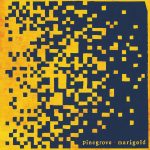
Connect to Pinegrove on
Facebook, Twitter, Instagram
Discover new music on Atwood Magazine
? © Caroline Tompkins
Marigold
an album by Pinegrove

